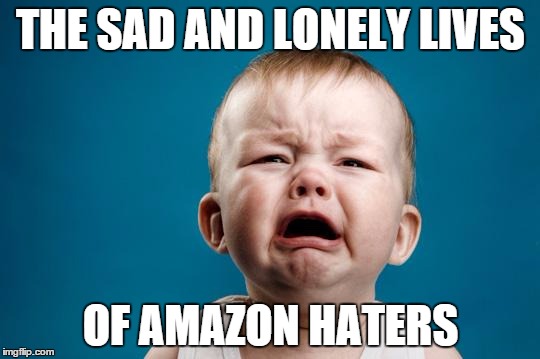Amazon is celebrating their 20th anniversary, but not everyone is participating in the festivities. Three of the largest collective bodies that represent authors have filed reports to the US Justice Department that stated “Amazon has used its dominance in ways that we believe harm the interests of America’s readers, impoverish the book industry as a whole, damage the careers of (and generate fear among) many authors, and impede the free flow of ideas in our society.”
The Authors Guild, the American Booksellers Association, the Association of Authors’ Representatives and Authors United have all sent letters to the US Justice Department and even published a piece in the New York Times today.
The requests for an investigation arise out of last year’s titanic battle between Amazon and the publisher Hachette. As part of an unusually bitter contract dispute, Amazon made it more difficult to buy Hachette books, which angered Hachette authors and others.
Amazon’s critics portrayed it as a predator. The retailer and its supporters said the critics were trying to preserve their privileges against a much-needed wave of digital disruption. The conflict left both sides bloodied but produced no clear winner.
The collective bodies of author bodies main arguments is that Amazon’s dominant position makes it a monopoly as a seller of books and a monopsony as a buyer of books. According to published figures, this one corporation now controls the sale of:
- More than 75 percent of online sales of physical books.
- More than 65 percent of e-book sales.
- More than 40 percent of sales of new books.
- About 85 percent of e-book sales of self-published authors.
The American Booksellers Association has even accused Amazon of Free Riding. “Amazon has long enjoyed three major competitive advantages over its brick-and-mortar counterparts: Without any physical stores, Amazon has low fixed costs, which enables it to offer lower prices than brick-and mortar stores, even when not selling below cost. Amazon can and does free ride off the sales and promotional efforts of brick-and-mortar stores (consumers browse the books at brick-and-mortar stores and then purchase them online at lower prices), greatly encouraging “showrooming.” Showrooming is the phenomenon whereby customers go to a physical bookstore to make a purchasing decision but actually purchase the item from an online retailer, in most cases Amazon. Amazon has even created an app to facilitate this practice, which allows customers to scan the barcode of a book in a brick-and-mortar shop and complete the purchase from Amazon’s website through their smartphones. Multiple industry research studies demonstrate that this is occurring, and publishers themselves have noticed increased Amazon sales during author events at bricks-and-mortar bookstores. State governments have subsidized Amazon with sales taxes avoidance. (Unlike bookstores, Amazon does not have to collect sales taxes in many locales.)”
This is the first time these collective bodies have ever banded together over a singular issue, the market dominance of Amazon. Will the Justice Department do anything about it? If they don’t, these author unions will be relegated to standing on a soapbox and shouting into the wind.
Michael Kozlowski is the editor-in-chief at Good e-Reader and has written about audiobooks and e-readers for the past fifteen years. Newspapers and websites such as the CBC, CNET, Engadget, Huffington Post and the New York Times have picked up his articles. He Lives in Vancouver, British Columbia, Canada.

